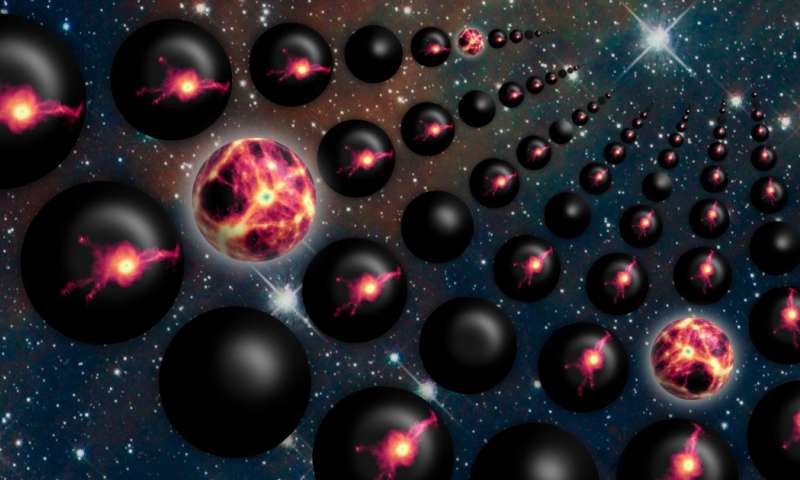What reality does quantum theory describe? QBism has a radical answer

- QBism, or Quantum Bayesianism, offers a radical interpretation of quantum mechanics, emphasizing the role of the observer and measurements, contrary to classical physics’ objective worldview.
- It posits that quantum mechanics is not about an external world devoid of human interaction, but rather about agents (observers) and their actions in making measurements and predictions.
- Shifting from a detached scientific perspective to one that integrates human involvement, QBism presents a profound change in how we understand our place in the Universe.
What is science for? What does it do? One answer to this question is that science describes reality: Its foremost job is to provide an account of the world we see around us, and it accomplishes this task via theories that provide a coherent and objective story about the world.
But what, exactly, is that story? The orthodox view is science provides a narrative of the Universe without us. It’s a story of what I often call the “God’s eye view,” or, as the philosopher Thomas Nagel calls it, “The View from Nowhere.” According to this account, science gives us the story of an external, independent, and objective reality (an EIOR). It’s a beautiful and enticing idea. Unfortunately, there’s a big problem with this story about science that lies in science’s own most powerful tool: quantum mechanics.
Quantum mechanics is what we physicists use to describe the microworld of molecules, atoms, and their constituents. Besides its century of spectacular success, what really makes quantum mechanics remarkable is that no one knows what it means. The story it tells about reality is so strange that it requires an interpretation to connect its mathematical formalism to the everyday world we experience. There is, however, a long list of these interpretations to choose from: “many-worlds” interpretations, “objective collapse” theories, “pilot-wave” theories, etc.
QBism
For me, however, there is only one well-developed interpretative framework that has really listened to what quantum physics has been trying to tell us for the last century. It’s called “QBism.” The name is a shorthand for “quantum Bayesianism” (which itself comes from the Bayesian interpretation of probabilities). Over the past few months, I’ve been writing a series of posts introducing and unpacking QBism’s interpretation of quantum theory. Today I want to dive back into it by addressing its view on the question we began with: What is science for? Or to put it another way, what is science about?
Up until the birth of quantum physics in the early 20th century, the dominant philosophy associated with science was that it was all about that world without us. The principal players in this story (now called classical physics) were objects like particles and the laws that governed them (i.e. Newton’s laws of motion). The laws themselves held a special kind of position and were seen as timeless, eternal expressions of an underlying fabric of reality (again, a world without us). The laws were objective structures where “objective” means existing independently of anything associated with human beings and their messy subjective experiences. There were, of course, “observers” in the theory who took data by making measurements. But the presence or the actions of those observers never played any fundamental role in physics.
Quantum mechanics killed that story forever by forcing measurements into the narrative in a way that classical physics never required. My friend and 13.8 co-conspirator Marcelo Gleiser has written a wonderful history of quantum physics where you can see how measurement appeared in quantum formalism. The single point we want to focus on here is how QBism understands the role of measurement.
While other interpretations of quantum mechanics work very hard to find a way to recover the easy dismissal of the observer enjoyed by classical physics, they must always pay a price. Sometimes that price is allowing for an infinity of unobserved parallel universes (as in the many-worlds interpretation). Other times, the price is different but equally strange. QBism, however, looks the problem straight in the eye and admits that quantum mechanics puts measurement front and center because it’s not a theory about some imagined objective world without us. Instead, QBism says that quantum theory is a potent description of agents taking actions on the world, which then responds.
Agents and actions
QBism wants us to see that from the very beginning, quantum mechanics was a science that relied on machines to carry out measurements in a world we did not directly experience. In this way, the machines (our instruments) acted as extensions of our experience. Quantum physics acknowledges that an action must be taken — i.e. a measurement — to set its mechanics in motion. But in reality, that action is always taken by somebody (i.e. an agent). You can tell stories about electrons making measurements by hitting a proton but that’s not actually what happens in quantum measurements. It’s always some agent setting up an apparatus and using quantum mechanics to predict what that apparatus will record.
It’s in this way that measurement’s explicit appearance in quantum mechanics implies that it’s always been a theory about those who make the measurements (i.e. us). We are the agents who use quantum mechanics to learn about the world. From QBism’s perspective, quantum theory is like a rulebook. It’s something we are given by the world (in our investigations of that world) that tells us how to make the best bets about the outcome of our actions. The idea of a “rulebook for betting” appears a lot in the QBist literature because QBism places such a strong emphasis on the fundamental role of probabilities in quantum formalism.
There is no doubt that this emphasis on agents and their actions is a radical idea. As I have written before, every quantum interpretation comes with a price. Gone is that comforting view of the world without us — of science providing a quasi-platonic view into the eternal order of mathematical perfection. What we get instead with QBism is an emphasis on agents and their actions. This new emphasis is, however, not some wooly-headed muddle. Instead, QBism offers a precise account, grounded in the tools of quantum information science, of the world and us together rather than just the one-sided world without us. Given that the price of such world-without-us views is hypotheses about infinite and unobservable parallel universes, QBism’s change in emphasis is not such a loss in my opinion. It responds honestly to quantum mechanics’ emphasis on measurement rather than trying to imagine it away. Just as important, switching to a story of the world and us opens up entirely new vistas for thinking about our place in the Universe.
Peering into those new horizons is what we will take up in the next installment of our tour of QBism.





